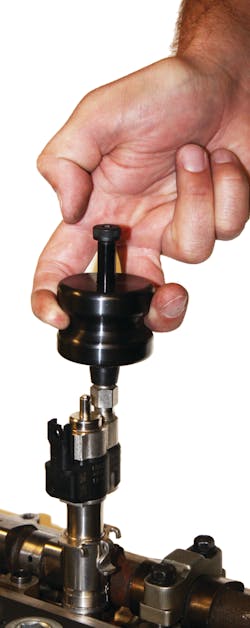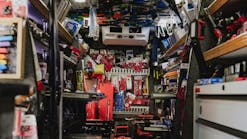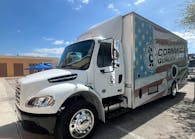Q: I already call on all the shops I can fit in a day. How can I increase my sales?
A: Don't you wish there was a tool to give you more hours in a day? So do your customers. You can increase your sales by selling tools that add more hours to your customer's day – more book hours, that is. Selling specialty tools is about selling time savings. The more specialty tools you can sell, the more money you and your customer can both make in a day.
"Imagine saying, 'I can show you how to do that job in half the time if you buy this tool,'" says 32-year tool industry veteran, Mike Rau, vice president of category management and marketing for Medco Tools. At that point, price becomes irrelevant, Rau says. The issue becomes buying time. If you can take a job that's rated at an hour and shave off 15 or 30 minutes, "you'll sell that tool every time!"
The Automotive Aftermarket Industry Association defines a specialty tool as "tools designed specifically for motor vehicle service repair (e.g., oil filter wrenches, torque sockets, micrometers)." That describes most of the items on your truck! To narrow it a bit, let's focus on specialty tools as tools for specific jobs.
In my mind, there are two groups of specialty tools: job-specific tools and brand-specific tools. A job-specific tool is something like an O2 sensor wrench that works on various makes and models. A brand-specific tool is more like a Sprinter fan clutch wrench that's pretty much exclusively for a specific job on a specific brand.
Selling both groups can be profitable, but with make/model specific tools especially, timing is everything. When you're calling on a tech, if he has a Sprinter in his bay and you have a fan clutch wrench in stock, it's an easier sale than trying to sell him one out of the blue. So it pays to ask your customer what he's working on that day. You may have just the tool in stock to make his day!
And once you sell that tool, be sure to order a replacement right away.
Q: With all the specialty tools on the market, I'm not sure selling a dozen or so a week really adds to my bottom line and I feel like some stuff just collects dust. If I really should carry them, how do I know which ones to inventory?
A: Get your customer out of a jam and you'll earn their loyalty and more purchases.
"He who solves my problem earns my trust," says Rau. He points out that once you sell a tech a good specialty tool, you become the "go-to guy" for problem-solving and time-saving tools.
"But you've got to know it to sell it. You've got to have it to show it. And you've got to show it to sell it," points out Rau. To sell specialty tools, you've got to show specialty tools.
"It's not just about showing what's new and frivolous, it's about what's new and purposeful," says Rau. To show what's new, you need to know what's new. And to sell what works, you need to know what works. Like anything in this business, it's all about keeping in the know.
To keep a pulse on what's available and to know what to stock you should follow your flag and WD's tool alerts and, as much as possible, attend their shows. Tool shows aren't just about meeting the manufacturers and seeing new stuff; it's also about talking to other dealers from across the country and seeing what is selling for them.
The Medco Show Sept. 27 and 28 in Philadelphia (www.medcocorp.com/show) will let you meet other dealers and see all the latest and greatest tools on the market, including specialty tools. As the self-proclaimed "largest combined PBE and tool and equipment wholesaler in the automotive aftermarket" in North America, Medco carries a broad line of general and specialty tools that you can sell to general, heavy duty and collision repair shops.
Q: I don't sell as many specialty tools as other dealers I know. What could I be doing wrong?
A: Good questions are often the key to closing more sales. So, I suggest you try asking more probing questions and see if that helps. Here is a quick list of questions to toss out to get a good feel for things:
- What job is in your bay right now?
- What are the hardest jobs you get? Are there tools to make those jobs easier?
- What are the most popular makes and models you're servicing?
- Do you have any specialty tools you really like and would recommend to others?
Knowing the popular and tough jobs your customers are getting will help you keep your eyes and ears open so you can sell the right tool for the job. If your customer doesn't know what tool may make a particular job easier, ask other techs on your route for advice.
Knowing the popular makes and models on your route will keep you thinking when you see a new make/model specific tool. If you don't see a lot of BMWs in your area, maybe you don't need to inventory a BMW injector puller. Not that you don't try to sell one, you just special order it.
And nothing beats a recommendation on a great tool from one tech to help you sell another!



